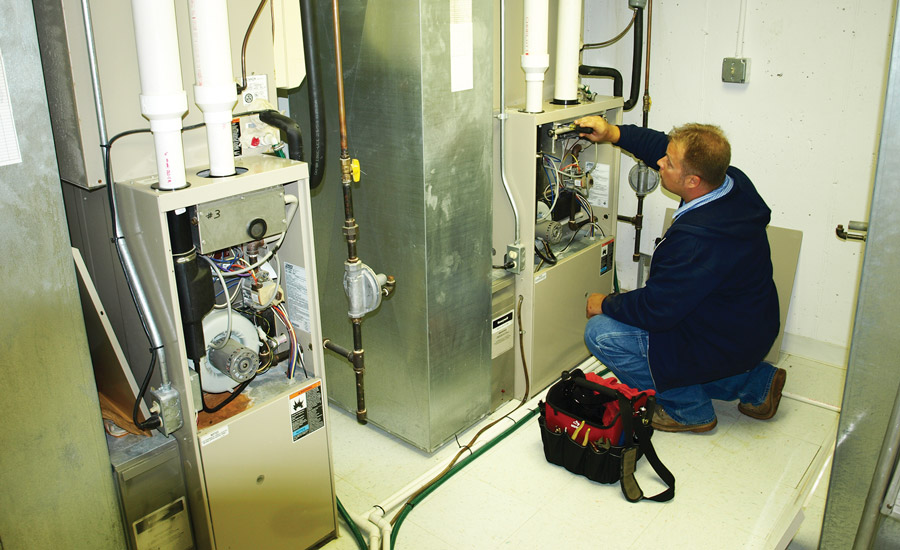The service department is often the unsung hero of a well-run HVAC contracting business. Profitability and long-term viability often hinge on the efforts of this department, and overlooking its importance is a mistake that could prove extremely costly.
With that in mind, there are numerous steps savvy contractors can take to ensure their service departments are running efficiently, while, at the same time, keeping employees and customers content with the work being conducted.
MEASURING PERFORMANCE
Ensuring a service department is firing on all cylinders starts with establishing some type of benchmark for success.
Butch Welsch, owner of Welsch Heating & Cooling in St. Louis, said his team uses a five-pronged approach to performance based on the number of service calls per month, average dollar amount per service call charge, the percentage of drive time, number of callbacks/recalls, and customer satisfaction reviews.
Similarly, Matt Marsiglio, operations manager for Flame Heating, Cooling, Plumbing, and Electrical in Warren, Michigan, said his team measures ticket revenue, billable efficiency, sale lead conversion, maintenance plan sales, and yield per call.
Ray Isaac, president of Isaac Heating & Air Conditioning in Rochester, New York, noted the first and most important metric is revenue.
“You must generate sales,” he said. “Nothing happens until somebody sells something. Labor management is critical, and there are different figures we use for residential and commercial jobs. We also measure subcategories, like labor efficiency for heating, technician’s hours, etc. The overall financials from many companies don’t track financials down to hundredths of a percent, but whole percent only. Those numbers really matter when working on a large scale. We look at unallocated time for our technicians and try to manage it.”
Isaac also said contractors should truly be measuring everything possible. He said he commonly sees contractors’ service departments operating in a sort of survival mode rather than implementing the tools and processes necessary to achieve success.
“They consolidate the department into everything else and hope it works,” he said. “They don’t manage it individually, and the department, as a whole, lacks a real strategy. Each service department must have a strategy.”
SKILLS AND MISTAKES
Part of any strategy is having the proper set of skills needed to complete a job. Welsch said, without question, people skills are vitally important when it comes to operating a service department.
“If an individual is not good with customers, we don’t want him — regardless how good he is at making repairs,” he said. “We had a service technician who worked 50 years for us. He had, at best, average technical skills, but was amazing with customers. He was, for many years, the most sought after technician in Greater St. Louis. People would wait days or weeks to make sure he was the one who was coming to their homes.”
In addition to people skills, having quality leadership in charge of the department is also extremely important.
“You can’t take your best technician and make him your service manager,” said Isaac. “These individuals are usually ill-equipped and not ready to lead others. They are frustrated and know they can’t do it. They end up walking away because they’re embarrassed. This leaves you without a service manager and your top technician. What is needed is a real manager — one who thinks strategically and knows how to manage people properly. You can’t overwork technicians, which is why we do split shifts, and our service manager knows how to balance everything out.”
Still, employees within the service department are bound to make mistakes, and there are a few of them to look out for.
“[Service department novices] can be overconfident in their diagnostic skills,” said Welsch. “They find a quick solution to what they see as the problem without necessarily making a full diagnosis of what is happening. We instruct them to be sure to take their time and look at everything that might be happening to cause the particular problem. We also want to make sure they don’t necessarily assume the first thing they find is the complete answer.”
Isaac mentioned that undercharging is common for his technicians when they first start working in the service department.
“Everyone thinks they are going to overcharge, but they end up feeling bad and say it didn’t take that long, so they undercharge,” he said. “That’s why we have a flat rate system, which dictates what we charge. With mobile technology, as soon as a call is done, the office gets the ticket. Technicians sometimes don’t like to collect because they are technicians, and it makes them uncomfortable. We must be profitable, and we are not killing people, but we also must charge a fair price.”
“I wouldn’t put this one on the service technician, but I would say we [contractors] have a habit of hiring once we see the demand; therefore, we rush technicians into the field without proper training,” said Marsiglio. “If you don’t set them up to succeed, don’t be disappointed when they fail. Forecast your staffing needs and hire to make sure enough training time is given for them to succeed. This is tough, because it means training will have to be performed when business can be hard to come by.”
HIRING WITH A GAP
As Marsiglio noted, it can be difficult to take the time necessary to properly train technicians while also keeping enough competent hands on deck in case business picks up.
Because of this, and with a serious technician gap on the horizon, having distinct hiring practices and discipline procedures is essential.
“If we are in need of a service technician, we spread the word among our vendors, especially those with service counters,” said Welsch. “We are considered a good company to work for, and we treat our employees well. Therefore, we typically have no trouble finding a good service technician when we need one. For someone new to the industry, we go through our Local No. 36’s apprentice system and interview a few of the top candidates. From there, we determine those who we feel will fit into our company the best.”
Marsiglio said Flame uses a three-interview process, which includes the potential tech bringing in his or her tools and working through troubleshooting in the lab. Once in the field, technicians have a clear set of rules and procedures to follow.
“We choose to make sure they are clear of what is expected of them,” he said. “If there is an ongoing issue, and we have provided them the proper training to overcome the issue, it eases the pain associated with having to discipline an employee.”
Discipline is something Isaac tries to ensure is done quickly and with tact.
“It has to be immediate, and it has to be done with a coaching mentality,” he said. “These people are working 70-plus hours some weeks. We just let a top technician go yesterday because he had an attitudinal problem. It’s the hardest thing we do. We need these people, but sometimes, we have to let them go.
“Be the hardest place to work but be the best,” Marsiglio continued. “Guys will stay with you when they get to go home early on a Friday, see a good bonus, or enjoy a nice dinner. The service department is a tough place — one of the toughest departments to run in a contracting company.”
SIDEBAR: FOUR PILLARS OF SERVICE DEPARTMENT SUCCESS
According to Butch Welsch, owner of Welsch Heating & Cooling in St. Louis, these four essential traits will ensure a service department functions to the best of its ability.
1. Communication: Keeping everyone informed about things is a very key component. These communications run both ways, between the office and the technicians and from the technicians to the office.
2. Working Together: It is extremely important for the department to work together. An example occurs when a technician who is scheduled to be the on-call technician has an issue come up. It is important that there is sufficient teamwork that someone is willing to fill in and take his place.
3. Show that You Care: This takes an effort because, in our case, service technicians never come into the shop, so our service manager and dispatcher have to work hard to make the service technicians know we appreciate what they are doing.
4. Keep a Positive Attitude: This can be hard when everyone calling in is calling because they have a problem. We have to remember that our job is to help people by solving their problems, which is a positive.
Publication date: 8/15/2016
Want more HVAC industry news and information? Join The NEWS on Facebook, Twitter, and LinkedIn today!





